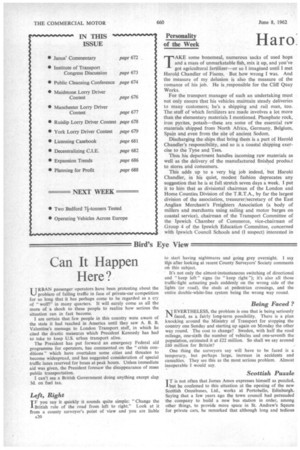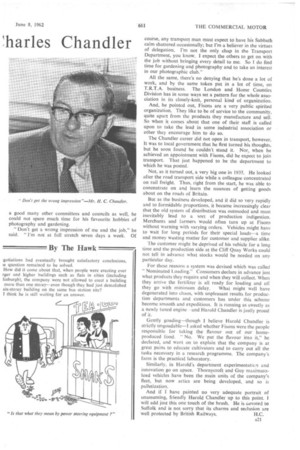Han)
Page 22

Page 23

If you've noticed an error in this article please click here to report it so we can fix it.
`harles Chandler
TAKE some bonemeal, numerous sacks of used hops and a mass of unmarketable fish, mix it up, and you've got agricultural fertilizer—or so I imagined until 1 met Harold Chandler of Fisons. But how wrong I was. And the measure of my delusion is also the measure of the romance of his job. He is ,responsible for the Cliff Quay Works.
For the transport manager of such an undertaking must not only ensure that his vehicles maintain steady deliveries to many customers; he's a shipping and rail man, too. The stuff of which fertilizers are made involves a lot more than the elementary materials I mentioned. Phosphate rock, iron pyrites, potash—these are some of the essential raw materials shipped from North Africa, Germany, Belgium, Spain and even from the site of ancient Sodom.
Discharging the ships that bring them is a part of Harold Chandler's responsibility, and so is a coastal shipping exercise to the Tyne and Tees.
Thus his department handles incoming raw materials as well as the delivery of the manufactured finished product to stores and consumers.
This adds up to a very big job indeed, but Harold Chandler, in his quiet, modest fashion deprecates any suggestion that he is at full stretch seven days a week. I put it to him that as divisional chairman of the London and Home Counties Division of the T.R.T.A., by far the largest division of the association, treasurer/secretary of the East Anglian Merchant's Freighters Association (a body of millers and merchants using sailing and motor barges on coastal service), chairman of the Transport Committee of the Ipswich Chamber of Commerce, vice-chairman of Group 4 of the Ipswich Education Committee, concerned with Ipswich Council Schools and (I suspect) interested in a good many other committees and councils as well, he could not spare much time for his favourite hobbies of photography and gardening.
"Don't get a wrong impression of me and the job," he said. "I'm not at full stretch seven days a week. Of course, any transport man must expect to have his Sabbath calm shattered occasionally; but I'm a believer in the virtues of delegation. I'm not the only chap in the Transport Department, you know. I expect the others to get on with the job without bringing every detail to me. So I do find time for gardening and photography and to take an interest in our photographic club."
All the same, there's no denying that he's done a lot of work, and by the same token put in a lot of time, on T.R.T.A. business. The London and Home Counties Division has in some ways set a pattern for the whole association in its closely-knit, personal kind of organization.
And, he pointed out, Fisons are a very public spirited organization. They like to be of service to the community, quite apart from the products they manufacture and sell. So when it comes about that one of their staff is called upon to take the lead in some industrial association or other they encourage him to do so.
The Chandler career did not open in transport, however, It was to local government that he first turned his thoughts, but he soon found he couldn't stand it. Nor, when he achieved an appointment with Fisons, did he expect to join transport. That just happened to be the department to which he was posted.
Not, as it turned out, a very big one in 1935. He looked after the road transport side while a colleague concentrated on rail freight. Thus, right from the start, he was able to concentrate on and learn the nuances of getting goods about on the roads of Britain.
But as the business developed, and it did so very rapidly and to formidable proportions, it became increasingly clear that the old system of distribution was outmoded and must inevitably lead to a sort of production indigestion. Merchants and farmers would often turn up at Fisons without warning with varying orders. Vehicles might have to wait for long periods for their special loads—a time and money wasting matter for customer and supplier alike.
The customer might be deprived of his vehicle for a long time and the production side at the Cliff Quay Works could not tell in advance what stocks would be needed on any particular day.
For these reasons a system was devised which was called "Nominated Loading." Consumers declare in advance just what products they require and when they will collect. When they arrive the fertilizer is all ready for loading and off they go with minimum delay. What might well have degenerated into chaos, with unpleasant results for production departments and customers has under this scheme become smooth and expeditious. It is running as sweetly as a newly tuned engine -and Harold Chandler is justly proud of it Gently goading—though I believe Harold Chandler is strictly ungoadable—I asked whether Fisons were the people responsible for taking the flavour out of our homeproduced food. "No. We put the flavour into it," he declared, and went on to explain that the company is at great pains to educate cultivators and to carry out all the tasks necessary in a research programme. The company's farm is the practical laboratory.
Similarly, in Harold's department experimentamn and innovation go on apace. Thornycroft and Guy maximumload vehicles have been the main units of the company's fleet, but now artics are being developed, and so is palletization.
And if I have painted no very adequate portrait of unassuming, friendly Harold Chandler up to this point. will add just this one touch of the brush. He is cievoted to Suffolk and is not sorry that its charms and seclusion are
well protected by British Railways. H.C.




































































































